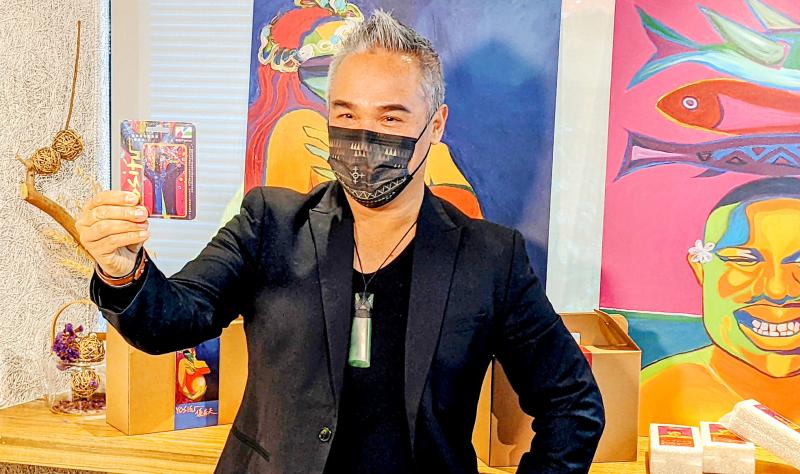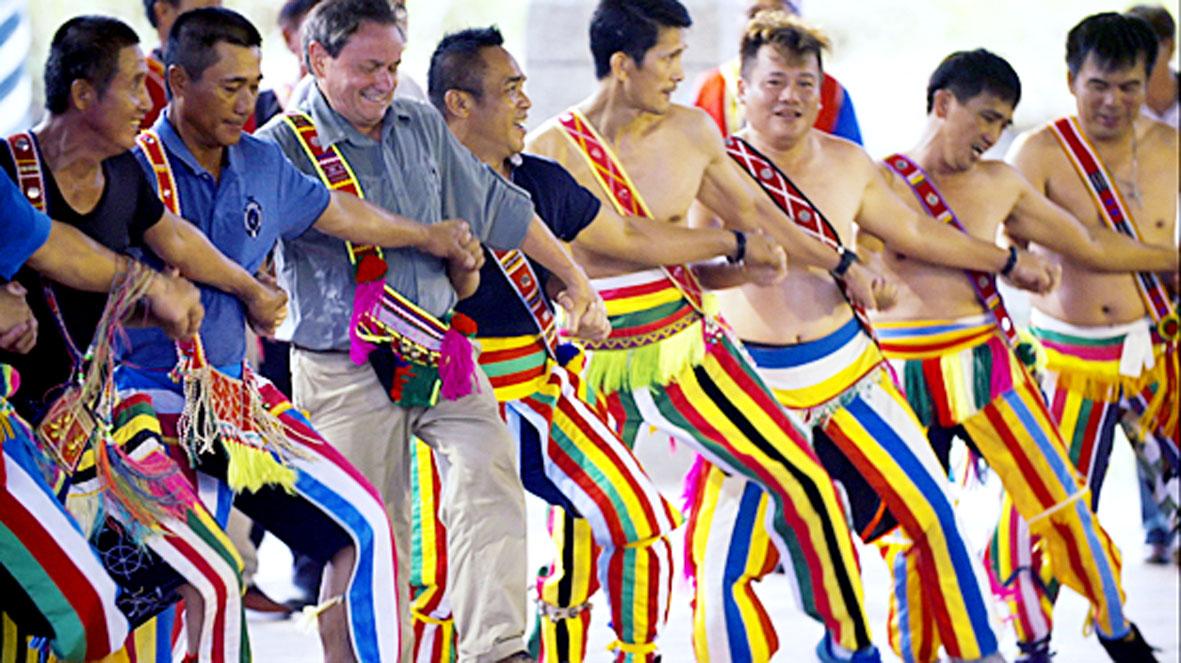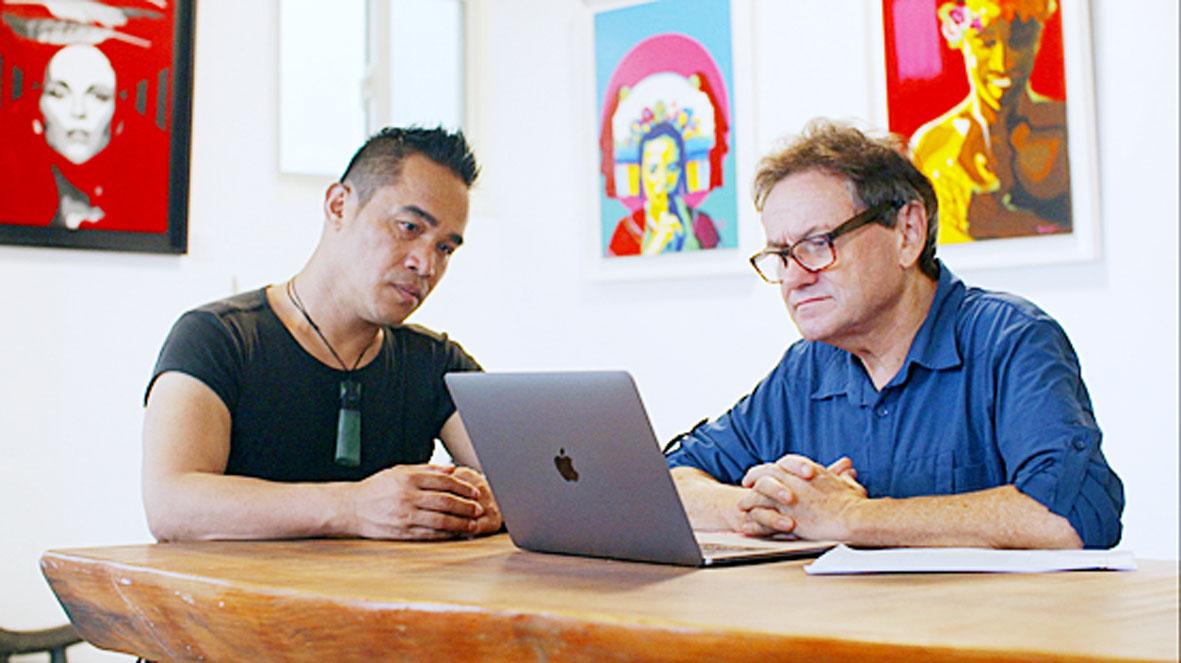Yosifu Kacaw thought National Geographic just wanted to chat about indigenous contemporary art. But at the end of the meeting, they announced: “You’re it. You will be the host!”
A confused Yosifu realized that it was a test. The production team had been searching for a co-host with British anthropologist Julian Davison for their upcoming special on the Austronesian migration, which is widely believed to have originated in Taiwan and spread as far as Madagascar, New Zealand and Hawaii.
The gregarious, animated Edinburgh-based Amis painter certainly has the personality for the task. But not only did he have no experience, he was also worried that his conversational English skills wouldn’t be enough for an academic program.

Photo: Han Cheung, Taipei Times
Yosifu took the job anyway, and he recalls tearing up when doing voiceover for a scene showing the first Austronesian explorers pushing their canoes out to sea from eastern Taiwan.
“I was moved by the bravery of my ancestors,” he says. “If they can be so brave, how could I be afraid of doing this? I want people to see that my ancestors were voyagers, and that I am so proud of them. And I hope the world can see and define Taiwan in a new light through the show.”
Premiering last Friday at 9pm in more than 40 countries, the show brings viewers through seven countries across the Austronesian world and explores the elements that connect the peoples of this vast area. There’s two more episodes to go — tomorrow’s will look at traditional wisdom such as tree-bark papermaking and pottery techniques. The finale next week focuses on symbolism, from tattoos to megaliths to architecture.

Photo courtesy of Pilot Public Relations
ISLAND HOPPING
Yosifu is also a voyager, as he splits his time between Europe and his home community of Matadim in Hualien’s Yuli Township (玉里). A fan of Discovery Channel as a child, Yosifu often wondered how amazing it would be to host one of these programs. “I feebly wished for it then, and now my dream has accidentally come true,” he says.
But the pressure was immense. Often jetlagged with no time to adjust, Yosifu says he stayed up late and woke up early every day to practice the academic terms and ideas of that day’s filming.

Photo courtesy of Pilot Public Relations
“But I was very happy because I made new discoveries everyday, just like how my ancestors discovered new lands,” he says.
Yosifu says he also felt an instant connection with the people he visited. Not only did he look like a local, there were also apparent similarities in their languages. Most of them knew of their ancestral connection to Taiwan, and the meetings were warm and natural.
“The women in Tonga all told me they were going to carry me home and feed me because I was too skinny,” he laughs.
Italian-Taiwanese director Stefano Centini knew that it was important to have an indigenous Taiwanese as one of the hosts, but he was also surprised by the level of bonding.
“We wanted an indigenous perspective ... not just on the science but about the human connection,” he says. “It was very striking ... When we went to New Zealand or Tonga and [Yosifu] was talking to the indigenous people there, I felt like I didn’t have to do much as director because the connection was so direct.”
Growing up in a time when society was harsh towards indigenous people, the 54-year-old Yosifu only embraced his identity later in life after he moved abroad. Even today, he feels that mainstream society still treats indigenous people as “exotic foreigners,” and he hopes that this production can promote general awareness — both at home and abroad — and help indigenous youth gain confidence by better understanding who they are.
“Indigenous people here have had problems with self identity due to the education system and environment,” he says. “We were assimilated into Han Taiwanese culture as children, and we never really got to learn about our distant past.”
NEW INSPIRATIONS
Amis legends say that they are the children of the sun, but Yosifu is actually deathly afraid of the heat. The self-described “polar bear” only goes home in the autumn and winter, and he hasn’t been to a harvest festival in his community for over 20 years.
He only returned in 2019 due to the filming. “It was so emotional. Nothing had changed,” he says. “They put the ceremony at the end of the program … as if it were a welcome home for me.”
One scene shows Yosifu painting a tree on a large canvas on his roof. It was another torturous scene as he had to finish it in one go under the hot sun, working for about five hours.
“They said I could paint anything I wanted to,” he says. “I painted this Tree of Life because I thought that one needs to have roots to come home. Only when you find your roots, can you become a big tree.”
“I hope I can be like a towering tree, where birds can rest, animals can live and people can find shelter from the sun and rain.”
The painting is now the face of Yosifu’s latest signature EasyCard, which was unveiled at a press conference on Tuesday. Part of the proceeds will go to the Luma Association Amis language immersion preschool, as well as a project with Guppy Inclusive, which helps indigenous farmers market organic or eco-friendly rice. With Yosifu’s painting of a pregnant woman gracing the slick packaging, they were able to bypass retailers and sell directly to customers.
It’s hard for farmers in agricultural areas to maintain environmentally friendly methods when their neighbors all spray their crops, and Yosifu hopes that these incentives will slowly change their minds.
The fellow Austronesians whom Yosifu met during his journey have also made it into his art. These pieces are on display through April 10 at the “Embrace — Austronesian Art Exhibition” (擁抱 — 南島藝術美展) at the Luodong Cultural Working House in Yilan County.
“I feel like I’m painting the descendants of my ancestors, and I’m bringing them home through art,” he says. “It’s as if I ‘drew’ them home.”

Jacques Poissant’s suffering stopped the day he asked his daughter if it would be “cowardly to ask to be helped to die.” The retired Canadian insurance adviser was 93, and “was wasting away” after a long battle with prostate cancer. “He no longer had any zest for life,” Josee Poissant said. Last year her mother made the same choice at 96 when she realized she would not be getting out of hospital. She died surrounded by her children and their partners listening to the music she loved. “She was at peace. She sang until she went to sleep.” Josee Poissant remembers it as a beautiful

For many centuries from the medieval to the early modern era, the island port of Hirado on the northwestern tip of Kyushu in Japan was the epicenter of piracy in East Asia. From bases in Hirado the notorious wokou (倭寇) terrorized Korea and China. They raided coastal towns, carrying off people into slavery and looting everything from grain to porcelain to bells in Buddhist temples. Kyushu itself operated a thriving trade with China in sulfur, a necessary ingredient of the gunpowder that powered militaries from Europe to Japan. Over time Hirado developed into a full service stop for pirates. Booty could

Lori Sepich smoked for years and sometimes skipped taking her blood pressure medicine. But she never thought she’d have a heart attack. The possibility “just wasn’t registering with me,” said the 64-year-old from Memphis, Tennessee, who suffered two of them 13 years apart. She’s far from alone. More than 60 million women in the US live with cardiovascular disease, which includes heart disease as well as stroke, heart failure and atrial fibrillation. And despite the myth that heart attacks mostly strike men, women are vulnerable too. Overall in the US, 1 in 5 women dies of cardiovascular disease each year, 37,000 of them

Before the last section of the round-the-island railway was electrified, one old blue train still chugged back and forth between Pingtung County’s Fangliao (枋寮) and Taitung (台東) stations once a day. It was so slow, was so hot (it had no air conditioning) and covered such a short distance, that the low fare still failed to attract many riders. This relic of the past was finally retired when the South Link Line was fully electrified on Dec. 23, 2020. A wave of nostalgia surrounded the termination of the Ordinary Train service, as these train carriages had been in use for decades